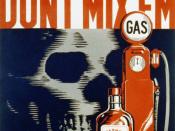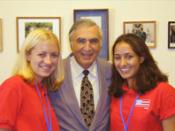Drunk driving was defined as a problem located within individuals. Drunk driving is illegal in every state. At that time the political atmosphere defined crime in terms of personal choice and individual responsibility. It is not only illegal, but unsafe to operate an automobile if you are under the influence of alcohol. When a person drinks, the alcohol is absorbed into the stream and various tests have been designed to measure the level of alcohol in a person's blood. In most states, if a person has a high alcohol level greater than .10%, that person is presumed to be too intoxicated to safely operate an automobile. Driving under the influence of alcohol is considered the nation's most frequently committed violent crime, and in the 1980's the public supported a wider range of non-criminal countermeasures, as well as stricter legal measures, to govern DUI's. This movement against drunk driving was well reflected in the legislative arena.
Between 1981 and 1987 some 934 new laws dealing with drunk driving were passed by state legislatures. Legal measures focus on deterring drunken drivers by providing stricter laws and punishment. Non-criminal countermeasures are concerned with reform and education and include treatment programs and educating citizens about the dangers of impaired driving. To prevent drunk driving, a combination of stricter laws with harsh punishments and non-criminal countermeasures must be implemented. Legal measures are said to protect citizens through deterrence.
Deterrence is defined as discouraging a particular behavior. There are two types of deterrence: individual or specific deterrence, and general deterrence. Individual or specific deterrence seeks to deter the offender from re-offending. General deterrence seeks to deter the public from criminal behavior through the punishment of offenders. "Deterrence is based on the perceived certainty, severity, and celerity of detection and sanction" (Vingilis 645). People who support...


